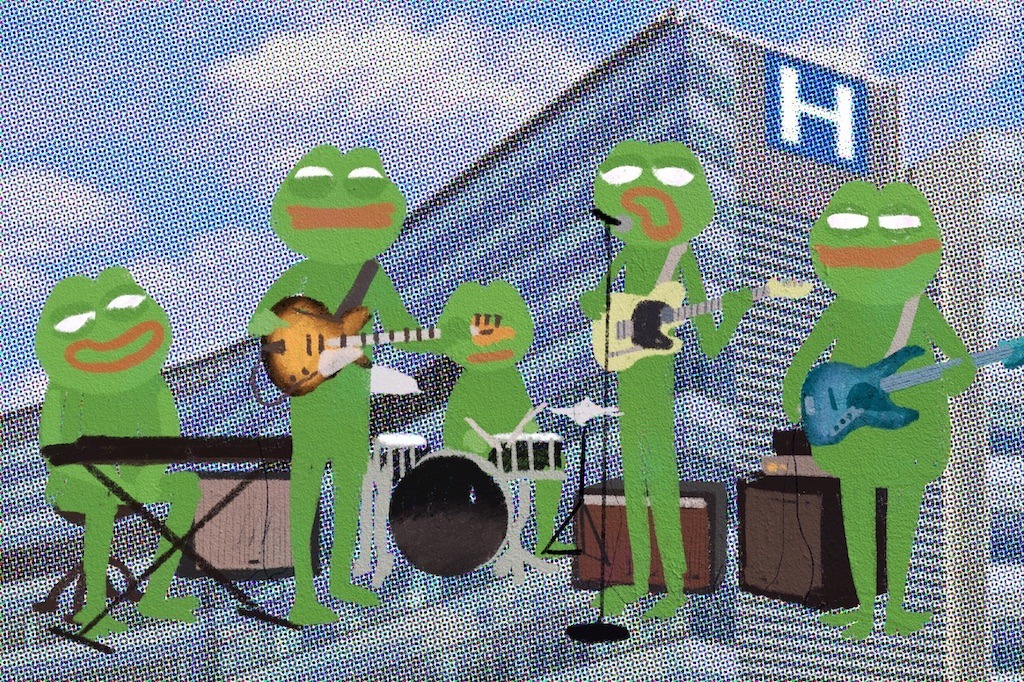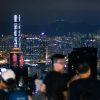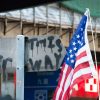Original: 【疫症觸發的香港運動陰暗面──談種族仇恨】, published in Ming Pao
Translators: P, yehua
If you would like to be involved in our translation work, please get in touch here.
I have participated in a few exchanges across Europe, hoping to build solidarity for Hong Kong with other radical, anti-government organizations. In doing so, I learned that anti-authoritarian groups have three main topics of interest when it comes to the Hong Kong movement: 1) how direct action is coordinated and organized; 2) why Hongkongers always wave American flags and support US President Donald Trump; and most surprisingly, 3) why Pepe the Frog has gained such a following. The reason they care about the popularity of Pepe is because in Europe and the United States, it has been used primarily by the extremist and racist far-right, so much so that its creator, Matt Furie, “killed” it in 2017.
On the first question, I still believe the most incredible thing about this movement is the ability of participants to learn and course-correct. After many years of being constrained by the “big stage”—mainstream political organizations and tactics—people’s energies and imaginations have finally been emancipated. In a short space of time, Hongkongers have adopted different strategies of direct action in order to shock the world into paying attention to their plight.
The second question is a little more difficult to tackle. In the eyes of internationalist activists, the United States is the symbol of imperialism. Since World War II, the US has invaded twenty-four countries in the name of “justice”; that the racist, white supremacist tycoon—an epitome of plundering and exploitation himself—Donald Trump is the President is even more abhorrent. Hongkongers’ support for American imperialism and Trump, perceived or real, alienates those defending human rights across the world. To explain this to these comrades, I often use the example of the whistleblower Edward Snowden, who sought asylum in Russia not because he supported the authoritarian Russian government, but because he had no other route to escape the American government’s grip. (But of course, he will not wave a Russian flag).
Even as I answered their third question, I regretted how I shied away from fully explaining the racial hatred that is hidden in Hong Kong’s social movement. As a Hongkonger, I understand only too well the xenophobic tendencies in Hong Kong, which have been lurking in the shadows from the Umbrella Movement to the ongoing protests. But as the movement still rages on in the face of a formidable enemy, we may not have had time to reflect—or have chosen to turn a blind eye to these tendencies. If I had the chance to explain the intricacies of racism in Hong Kong to them again, I would perhaps mention the anti-refugee faction of the Catalan independence movement as an example.
While in Barcelona, I had looked around for the most up-to-date information about the Catalan movement, which seemed to be taking a breather after large rallies protesting the heavy sentencing of pro-independence advocates have died down. I happened upon an anti-extradition bill movement exhibition organized by an overseas comrade, and suddenly thought of an interview conducted with Edward Leung, a young political activist who was also facing a heavy sentence. Leung, who previously did an exchange in Catalonia, said he learned that the movement is not founded on Catalans’ hatred against Spaniards, but based on their love for Catalonia. He is a talented politician; I am guessing that at the time, he had already sensed that the seeds of racial hatred have been sown in the localist movement, and had always emphasized the need to “correct” the populist tendencies of the movement.
The Wuhan I know is the center of Chinese punk and a home base for anti-government young people.
Apart from “correction,” there are several terms surrounding Leung’s legacy that I have been repeatedly chewing on: What does “guangfu” (光復, can mean “to liberate”, “to reclaim”, “to restore”) mean? What is “our time”? He emphasized the values of unity, loyalty, and sacrifice within his organization; and in a twist of fate, the Hong Kong Police Force changed their motto to “honor, duty and loyalty.” Leung’s comrade, Ray Wong, previously a high-profile localist who opposed new immigrants, has now been granted asylum in Germany, benefiting from their internationalism. Leung’s organization spearheaded attacks on parallel traders from the Mainland in the name of “reclaiming” Hong Kong; now Hongkongers have resorted to scouring the world for surgical masks because of an incompetent government. Leung himself was born in Wuhan in Hubei Province, and was previously mocked by his political enemies as “Hubei Kei.” Today, whenever we hear “Wuhan,” all we may be able to associate the city with is the coronavirus pandemic. Whenever we think about Wuhan people, what comes to mind most likely is people who tend to eat bats, spit at medical staff, and run away from the quarantined city.
I feel grateful that I happen to be a musician, because music liberates people from narrow worldviews. The Wuhan I know is the center of Chinese punk and a home base for anti-government young people. I have listened to SMZB, gone to a Subs gig, and missed out on HuaLun. In 2012, the renowned punk Mai Dian organized an autonomous, experimental space called “Our Home”, and published a magazine called “Chaos”, translating anarchist articles from around the world. At the time, I also helped manage Hong Kong’s indie industrial building music scene; I didn’t personally visit “Our Home”, but have read countless articles about it. I think the most fascinating thing about musicians is that our ways of relating to each other and identifying with a community is different from the general public’s. We are more likely to seek recognition through participating in—as pedagogists Wenger and Lave call it—communities of practice: I see you as a punk, a rocker, a hip-hop fan, a raver… These “communities of practice” are borderless.
Born in an authoritarian country, you can still become an anti-establishment punk; born in Hong Kong, you can still become an anti-capitalist rocker.
I didn’t really think about this when I was younger; I only knew that I had friends of many different skin colors and nationalities who rebelled against the mainstream, as well as friends who were more conservative and opposed social progress. So when someone says people of a certain nationality necessarily behave one way or the other, I can never bring myself to agree. If everyone you interact with is of similarly dubious character, then this probably has to do with a problem with your social circle. When I got older, I understood even better the irrationality of nationalism: We have never had the right to choose where we are born. From the very beginning, this has been arbitrary. In reality, identity politics is exactly what cultural theorist Stuart Hall would describe as “a process of becoming.” Born in an authoritarian country, you can still become an anti-establishment punk; born in Hong Kong, you can still become an anti-capitalist rocker.
Today, in the name of fighting the coronavirus, some “yellow” (supporters of and participants in the pro-democracy movement) shops have put up signs reading: “We do not welcome Mandarin-speaking customers” or “Hongkongers only.” This move has raised many questions. First of all, Mandarin is the second-most spoken language in the world—what about Taiwanese, Malaysian, Singaporean people? Some of my Japanese and Korean comrades speak Mandarin, and joked to me that if they dined at these establishments, they would probably be beaten up.
Secondly, by my guess, since the “yellow economic circuit” was established, there must have been Mandarin-speaking Mainland Chinese or new immigrant comrades who have supported these stores—so how has it become so easy to put up these statements full of hate speech? Don’t we all know about the defiant existence of dissidents in China despite relentless persecution by the Chinese Community Party and its censorship of the press? On the other hand, Carrie Lam, Hong Kong’s chief executive, speaks Cantonese and carries a Hong Kong identity card—but which restaurant would be willing to serve this ghoul?
Racism will isolate Hong Kong and force the movement into an impossible framework: a fight between 8 million and 1.2 billion people.
I don’t think these “yellow” shops are unaware of this line of reasoning. But as cultural theorist Egbert Alejandro Martina has pointed out, the oversimplification and objectification of the “Other” is an irrational, racist process that creates pleasure. Having experienced more than half a year of trauma from the protest movement, “yellow” shops and “yellow-ribbon” Hongkongers may have become tempted by and drawn to this form of gratification. For instance, a meme has since been circulated, proclaiming that “it would be great if all Chinese people were killed off” by the virus. In reality, we are no strangers to this kind of irrational racism: The CCP is an expert at producing this kind of extremist racist ideology, managing to justify even its abhorrent persecution of the Uyghur people. We often chastise “little pinks” (young overseas supporters of the CCP) for failing to separate the ruling regime from the nation. Ironically, however, many of us can barely separate whether we are anti-CCP or anti-Mainlanders.
The point of saying all this is not for the sake of political correctness, but to point out that racism will only hurt, rather than help, Hong Kong’s movement. Racism will isolate Hong Kong and force the movement into an impossible framework: a fight between 8 million and 1.2 billion people. If the movement is founded on the basis of racial hatred, the international community’s view of the entire movement will also change. So far, we have been able to obtain international support because of Hongkongers’ courage in the face of authoritarian tyranny—why can’t we elevate our spirit of resistance, as developed in this movement, into a core part of our identity, thus displacing nationalist rhetoric and positioning ourselves in opposition to authoritarian government? If we care about “connecting” with others who are also struggling against authoritarianism, then we should find natural allies in Mainland China—the more, the better. In this context, it is the “non-Hongkongers” who know how to “punish” (in pro-democratic movement lexicon, to “punish” means to “support”) “yellow” shops who hold the key to our success. We often say we “love” Hong Kong, but which values are we really in love with? Is it freedom and equality? Is it social justice? Can we build a community of practice based on freedom and justice, instead of offering Hong Kong’s position in the global economy as a bargaining chip?
In Hong Kong, Pepe has been reborn as a totem of resistance against authoritarian tyranny. I have admired this process of “correction,” and I think that its previous incarnation as a symbol of racism in Europe and America serves as an important cautionary tale. I believe this movement’s incredible ability to learn from its mistakes and course-correct is precisely the quintessence of our oft-repeated slogan: “Be water.” For this reason, I remain optimistic. Now that the death of whistleblower Dr. Li Wenliang has spurred Mainlanders’ demands on toward freedom of speech and expression, will we be able to conceive of this as a fight for freedom against the CCP, and a turning point for our collective liberation? The greatest fear of any authoritarian power is precisely when people’s initial demands for liberty and openness gain momentum and morph into a torrential movement for broader social justice. If the embers of resistance are now lighting up in Mainland China, yet all we do is jeer and mock in response, we will risk paralysis in the international movement against authoritarian power—a type of failure tantamount to those of pro-Beijing and pro-police “blue ribbons” whose reactionary values we have always unwaveringly denounced.





